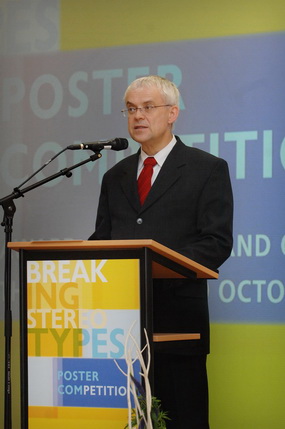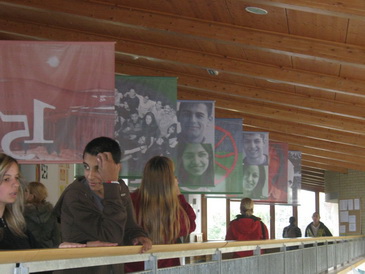16.10.2009High-level meeting “Contribution of EU funds to the integration of Roma”
High-level meeting “Contribution of EU funds to the integration of Roma” took place on October 13, 14 and 15 in Hungary. It was organized by DG Employment, Equal Opportunities and Anti-discrimination of the European Commission and the Government of Hungary. The meeting brought together representatives of European Commission, national governments of the counties-members of EU and Roma NGOs. Bulgaria was represented by Valentina Simeonova (deputy minister of labour and social policy), Milen Milanov (national coordinator of the Decade of Roma inclusion), officials form Ministry of Labour and Deyan Kolev (Center “Amalipe”)
The conference in Budapest
There is no doubt that Roma inclusion is one of the major tasks and it is of common interest of Roma and non-Roma citizens, said Lazslo Solyom, the President of Hungary in his opening statement. Roma want their integration as well as they want to preserve and further develop their culture and identity and this should be respected. Until now the efforts for Roma integration did not achieve their intended results. One of the main reason for this was that one the same approach was applied for diverse groups that have different needs. It is clear that integration could not happen without desegregation in all fields, without better education and employment and this should be realized through diverse ways and measures. We need funds but we also need charismatic persons to manage them and effective institutions – explained President Solyom.
 The situation of Roma is desperate and many plans were ruined – stated Vladimir Spidla, EU Commissioner on Employment, Equal Opportunities and Anti-discrimination. The European Union could not alone solve this problem. The Union will help the efforts of national governments through political engagement, anti-discrimination legislation, analytical support and financial support through EU funds. The European Social Fund, the European Fund for Regional Development and the Rural Development Fund will support efforts for Roma inclusion in important fields as: education, employment and residential support (housing and infrastructure). Multiple projects that cover these fields are necessary. To use EU funds for Roma – this is an imperative! Roma integration is for for the entire society, it is not a issue of cost but of benefit – said Commissioner Spidla.
The situation of Roma is desperate and many plans were ruined – stated Vladimir Spidla, EU Commissioner on Employment, Equal Opportunities and Anti-discrimination. The European Union could not alone solve this problem. The Union will help the efforts of national governments through political engagement, anti-discrimination legislation, analytical support and financial support through EU funds. The European Social Fund, the European Fund for Regional Development and the Rural Development Fund will support efforts for Roma inclusion in important fields as: education, employment and residential support (housing and infrastructure). Multiple projects that cover these fields are necessary. To use EU funds for Roma – this is an imperative! Roma integration is for for the entire society, it is not a issue of cost but of benefit – said Commissioner Spidla.
Deep poverty is not Roma matter and Roma question is not only poverty question – stated Livia Jaroka, the only member of European Parliament from Roma origin. The situation with Roma integration is desperate in many small villages where schools were closed, the institutions do not function and the infrastructure is missing. Unfortunately the European funds seldom reach these villages. From the other side people from the poorest micro-regions (both institutions and Roma NGOs) lack skills, staff and budget to handle EU projects. The EU monitoring system should be extended in order to cope with these problems. Mapping the most vulnerable micro-regions is necessary; special money for mapping should be included within the funds. Roma NGOs participation is of crucial importance – insisted Livia Jaroka.
The Hungarian Minister for Social Affairs and Labor Laszlo Herszog, the Czech Minister for Human Rights Kosab Michael, MEPs, MPs, governmental officials and Roma NGO activists took part in the discussion. Good practices in the fields of education, employment, rural development, infrastructure and urban development were presented. The main problems in fund absorption were also discussed: delays in payment, complicated reporting requirements, complicated application procedure, lack of sustainability.
In his statement Deyan Kolev (Center Amalipe) pointed that under the conditions of economic crisis the national governments try to orient the EU funds mainly to preserving the jobs of employed people. The most vulnerable groups (and many Roma) fall aside the scope of EU funds in this way and their situation will deteriorate additionally. It is a time for European Commission to interfere and to pursue the national government to allocate EU funds for the inclusion of the most excluded groups – this is the long-term investment we need. Deyan Kolev also pointed that the operational programs should include vulnerable groups (and Roma) targeted measures: otherwise the mainstreaming approach would not work.
Visit in Pecs, Miskolcs, Debrecen and Szeged
 On October 14 and 15 te participants split in groups and visited Pecs, Miskolcs, Debrecen and Szeged to see at the terrain how EU funds helps Roma integration. It was not a surprise that the picture in countryside appeared much different that the one in Budapest. Representatives of Roma self-government in Pecs assured that the EU funds had not changed the situation of Roma. Usually Roma are searched only as partners in different projects but this partnership is rather formal. Pecs municipality approved anti-segregation plan – this is requirement for EU funds absorption in Hundary – but until now this document is just a paper tiger without implementation. The Roma self-government could not be a beneficiary of EU projects and meets permanent financial problems, explained Dr. Istvan Kosztics, President of Roma self-governance in Pecs. The discrepancy between expectations and real responsibilities is huge and until now EU funds are not used for overcoming this discrepancy – insisted Dr. Kosztics.
On October 14 and 15 te participants split in groups and visited Pecs, Miskolcs, Debrecen and Szeged to see at the terrain how EU funds helps Roma integration. It was not a surprise that the picture in countryside appeared much different that the one in Budapest. Representatives of Roma self-government in Pecs assured that the EU funds had not changed the situation of Roma. Usually Roma are searched only as partners in different projects but this partnership is rather formal. Pecs municipality approved anti-segregation plan – this is requirement for EU funds absorption in Hundary – but until now this document is just a paper tiger without implementation. The Roma self-government could not be a beneficiary of EU projects and meets permanent financial problems, explained Dr. Istvan Kosztics, President of Roma self-governance in Pecs. The discrepancy between expectations and real responsibilities is huge and until now EU funds are not used for overcoming this discrepancy – insisted Dr. Kosztics.
His words were fully proved during the visit in Gilvanfa, Ormansag micro-region. In this village populated 100 % by Roma from Beashi group the unemployment rate reaches 90 %. No EU project has been implemented there. The village mayor explained that this is because of lack of capacity for preparing EU applications and because municipalities (not villages!) are beneficiaries. “We do not have educated people, I graduated only primary school. The other villages have better links to municipality authorities and that is why the EU funds go only to the surrounding Hungarian-populated villages” – pointed the mayor.
EU project is still not implemented in the prominent Ghandy Secondary Grammar School. Perhaps this will change soon since the school have prepared and submitted EU applications. Ghandy Gymnasium does not meet serious financial problems because it has  many students and receive additional amount as minority school. The teachers (most of them - Roma) are highly motivated to fulfill their task, namely forming Roma elite. They are proud that 76 % of their graduated students are enrolled in Hungarian universities. “Most of the teachers have skills for preparing project applications and we did prepare our first EU application. It is for publishing school materials in Roma and Beashi languages. We expect the project approved until the end of this year” – explained the school master.
many students and receive additional amount as minority school. The teachers (most of them - Roma) are highly motivated to fulfill their task, namely forming Roma elite. They are proud that 76 % of their graduated students are enrolled in Hungarian universities. “Most of the teachers have skills for preparing project applications and we did prepare our first EU application. It is for publishing school materials in Roma and Beashi languages. We expect the project approved until the end of this year” – explained the school master.








